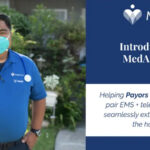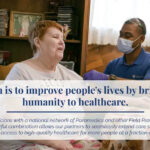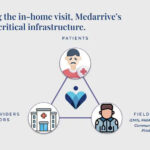Uber exec raises $25m to tackle growing in-home care market

LONDON: An uber executive has raised $25 million to tackle the growing in-home care market.
Dan Trigub and Inna Plumb are betting that one major pandemic-induced healthcare trend will stick around.
In 2020, Trigub, who used to run the health division at Uber, and Plumb, a former venture capitalist, joined forces to start MedArrive, a digital-health company that works with hospitals, nurses, insurance companies, and emergency medical services companies to facilitate healthcare visits in patients’ homes.
On Wednesday, the duo announced that the company, which has about 20 full-time employees, raised $25 million in Series A funding. Section 32 led the round, which included participation from new investor 7wireVentures and MedArrive’s existing investors Kleiner Perkins, Define Ventures, and Redesign Health. SCAN Health Plan, a MedArrive customer, also invested in the company.
MedArrive distinguishes itself from its direct-to-consumer competitors such as Ro, which acquired the on-demand nursing platform Workpath in December, by working directly with hospitals, insurance plans, and other digital-health companies instead of selling its healthcare services to patients who then pay in full up front. Trigub explained that many MedArrive patients are on Medicare Advantage or Medicaid managed plans and therefore don’t always have the means to navigate new mobile apps or pay out of pocket for healthcare.
Similar to telemedicine software startups like Wheel, MedArrive also offers its software to insurance companies like Bright Health to run what Trigub calls the “backbone” of home-care management. The software handles the logistics of sending an EMT or paramedic to a patient’s home for nonemergency care, creates an efficient route for the EMT between different patient visits, and holds all of the visit details in a single place for easy access during and after the appointment, he said. In the case of Bright, patients would never know they were using MedArrive because the software and personnel all have Bright logos or T-shirts.
“It’s not the idea that you download an app and get a person there in a few minutes on demand,” Trigub told Insider. “We are focused on building a deep relationship with health systems and providers to extend their care beyond the hospitals.”
MedArrive’s network of EMTs, paramedics, and hospital staff allow it to staff up or down depending on a hospital or insurance plan’s needs, Trigub explained. The healthcare providers are not directly employed by MedArrive and are still employees of the hospitals or EMS companies. The partnerships with EMS companies also mean that the company can help hospitals in rural areas just as easily as urban areas because the employees are already in place, and MedArrive doesn’t need to go out and recruit more people for its network. MedArrive primarily focuses on EMTs and paramedics because they are trained to administer a range of medical care beyond what they usually use for emergency services, Trigub said.
“Dan was unique in recognizing the number of different things that the EMTs could provide and that they are localized networks that can work in all kinds of regions and territories,” the Section 32 managing partner Andy Harrison told Insider.
MedArrive provided Insider with the presentation it used to raise $25 million in Series A funding from Section 32, 7wireVentures, Kleiner Perkins, Define Ventures, Redesign Health, and SCAN Health Plan, among others. The presentation was lightly edited to remove sensitive financial information, details about some customers, and software intellectual property before publication.






















